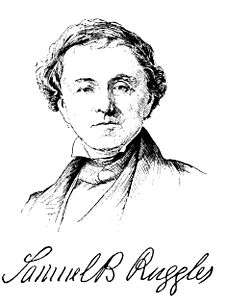
Samuel B. Ruggles
Samuel Bulkley Ruggles (April 11, 1800 - August 28, 1881) was an American lawyer and politician from New York. He was a member of the New York State Assembly in 1838, and a Canal Commissioner from 1839 to 1842 and in 1858. As a large landholder, he donated the land for the creation of Gramercy Park in New York City. Its restrictive covenant has preserved it through much development nearby. He was a member of the city's Chamber of Commerce, which published his reports on economics and public policy. In the 1860s, he represented the United States at several international conferences on economics and statistics in Europe.
Life
Samuel Ruggles was born in New Milford, Litchfield County, Connecticut, the son of Philo Ruggles, who became Surrogate and District Attorney of Dutchess County, New York. Samuel was a precocious student and graduated from Yale College in 1814 at the age of 14. Although he read for the law, he had to wait to be admitted to the bar until he came of age in 1821. He was a successful lawyer in New York City for several years and accumulated large landholdings, but eventually gave up the practice of law for public affairs.

Samuel
Samuel (/ˈsæm.juː.əl/;Hebrew: שְׁמוּאֵל, Modern Shmu'el, Tiberian Šəmûʼēl; Arabic: صموئيل Ṣamuil; Greek: Σαμουήλ Samouēl; Latin: Samvel; Strong's: Shemuwel), literally meaning "Name of God" in Hebrew, is a leader of ancient Israel in the Books of Samuel in the Hebrew Bible. He is also known as a prophet and is mentioned in the second chapter of the Qur'an, although not by name.
His status, as viewed by rabbinical literature, is that he was the last of the Hebrew Judges and the first of the major prophets who began to prophesy inside the Land of Israel. He was thus at the cusp between two eras. According to the text of the Books of Samuel, he also anointed the first two kings of the Kingdom of Israel: Saul and David.
Biblical account
Family
Samuel's mother was Hannah and his father was Elkanah. Elkanah lived at Rama-thaim in the district of Zuph. His genealogy is also found in a pedigree of the Kohathites (1 Chron. 6:3-15) and in that of Heman, his great-grandson (ib. vi. 18-22). According to the genealogical tables, Elkanah was a Levite - a fact otherwise not mentioned in the books of Samuel. The fact that Elkanah, a Levite, was denominated an Ephraimite is analogous to the designation of a Levite belonging to Judah (Judges 17:7, for example).

Samuel (Raffi novel)
Samuel (Սամվել Samvel) is an 1886 Armenian language novel by the novelist Raffi. Considered by some critics his most successful work, the plot centres on the killing of the fourth-century Prince Vahan Mamikonian and his wife by their son Samuel.
Translations
References
Samuel of Nehardea
Samuel of Nehardea or Samuel bar Abba (Hebrew: שמואל or שמואל ירחינאה) was a Jewish Talmudist who lived in Babylonia, known as an Amora of the first generation; son of Abba bar Abba and head of the Yeshiva at Nehardea. He was a teacher of halakha, judge, physician, and astronomer. He was born about 165 CE at Nehardea, in Babylonia and died there about 257 CE. As in the case of many other great men, a number of legendary stories are connected with his birth (comp. Halakot Gedolot, Giṭṭin, end; Tos. Ḳid. 73a s.v. Mai Ikka). In Talmudic texts, Samuel is frequently associated with Abba Arika, with whom he debated on many major issues. He was the teacher of Rabbi Judah ben Ezekiel. From the little biographical information gleaned from the Talmud, we know that Samuel was never ordained as a Tanna, that he was very precise with his words (Kidd. 70), and that he had a special affinity for astronomy: one of his best known sayings was that "The paths of heaven are as clear to me as the pathways of Nehardea."
Podcasts:
Samuel
ALBUMS
- Relentless released: 2011
- Freestyle's Best Extended Versions, Volume 1 released: 2003
- Sivil Ulyd released: 1997
- Texas Is The Reason / Samuel released: 1995
- Unwind, Volume 2 released:
Samuel
ALBUMS
- DAMN! The Mixtape, Volume 1 released: 2009
Samuel
ALBUMS
SAMUEL.
ALBUMS
Samuel
ALBUMS
- I Came, I Saw, Volume 2 released: 2011
Samuel
ALBUMS
- Flora & Fauna released: 2012
Samuel
ALBUMS
- Radio Punkreas released: 2014
- Hai paura del buio? released: 2014
- Dove sei tu released: 2007
- Triathlon released: 2005
- Cristina Donà released: 2004
Hai paura del buio?
Released 2014- Hai paura del buio?
- 1.9.9.6.
- Male di miele
- Rapace
- Elymania
- Pelle
- Dea
- Senza finestra
- Simbiosi
- Voglio una pelle splendida
- Terrorswing
- Lasciami leccare l'adrenalina
- Punto G
- Veleno
- Come vorrei
- Questo pazzo pazzo mondo di tasse
- Musicista contabile
- Sui giovani d'oggi ci scatarro su
- Mi trovo nuovo
- Televisione

